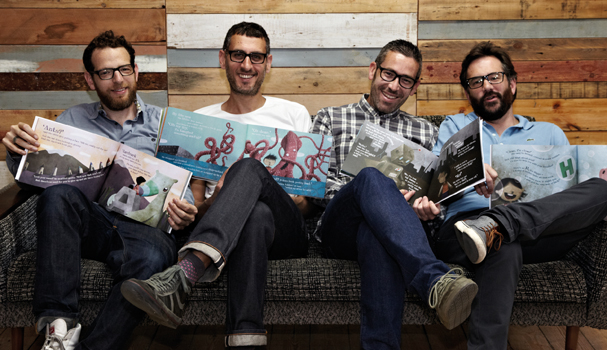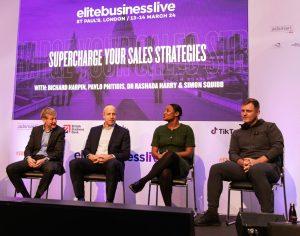Like many business owners, Asi Sharabi, co-founder and CEO of Lost My Name, didn’t expect to end up where he is now. Describing himself and his three business partners as “accidental publishers”, Sharabi explains that apart from one, none of the other founders come from a background that has anything to do with publishing.
Lost My Name is a personalised children’s book that comes in two versions – The Little Girl Who Lost Her Name and The Little Boy Who Lost His Name. The name in question is that of the child reading the book and having awoken one morning to discover they have lost their name, they go on an action-packed adventure to find it. On this adventure they meet a series of animals and creatures, each corresponding to a letter in their name, and in the end, voila, they are reunited with their name. With over 250 combinations of stories and illustrations, books are completely personalised to the child in question.
All customers have to do is enter a name and select a gender and the company’s website allows them to preview the entire personalised book before the buy. “We’re interested in combining the power of storytelling with the possibilities of technology,” Sharabi says. A seasoned business strategist, he has also worked in advertising and marketing. His PhD with the London School of Economics, which brought him to the UK in the first place, was on how to get kids in Israeli and Palestinian to see things from the other’s point of view. So while his new venture is very different in nature, he is no stranger to working with the interests of children in mind.
The idea for Lost My Name all began with a present he gave his daughter. “It started off when I bought Thalia one of these personalised books, which was rather lame and uninspired. I showed it to my friends – and now business partners – Tal and David and we had this nagging feeling we could do it better.”
Personalised books have been around for a long time but they’re usually a bit of a gimmick. “The medium has never been taken seriously as a creative canvas for storytellers, so we thought: ‘Hey, there’s an opportunity here.’” The founders’ focus is on engaging narratives and charming illustration.
David Cadji-Newby is in charge of all the writing. He’s been a freelance writer for 15 years and has written comedy for Fonejacker, The Peter Serafinowicz Show and Alan Carr Chatty Man, among others. He also released his first crime novel two years ago, but it was during his stint in advertising that he met Sharabi. Tal Oron has a background in creative tech. “Tal and I are both very data and metric driven,” says Sharabi. Soon enough they had the Portuguese visual artist and designer Pedro Serapicos on board too. “When we saw Pedro at work it was love at first sight. We immediately knew he was the person to illustrate our book,” says Sharabi.

While David and Pedro come from a more traditional storytelling background, Tal and Asi – coming from a background in building digital products and services – describe themselves as “aging digital natives”. Together the four-piece are the perfect combination for a personalised, digital children’s book company.
While Lost My Name started off as a creative challenge among a few friends, a self-funded side-project, it wouldn’t remain that way for long. “Deep down I knew if we cracked it there would be a commercial opportunity as well,” says Sharabi.
On a whim the business started trading in April last year and for the first three or four months was selling around 300 books per month. “This was mainly to friends and friends of friends,” explains Sharabi. The fledgling company then began trading through e-commerce site Notonthehighstreet.com (whose founder Holly Tucker graced the cover of Elite Business earlier this year), through which it sold about 1,000 books per month. Having been featured on the Notonthehighstreet.com newsletter 1,500 of the startup’s books were sold in just a single weekend – three times sales for the previous three months.
“That was the first moment we realised something interesting was happening.” In the run up to Christmas sales really ramped up and a whopping 20,000 books were sold. “That took us completely by surprise,” says Sharabi.
Lost My Name currently has a growth rate of 100% per month but at one point in its formative stages growth was as high as 1,000% per month. So it wasn’t long before these three dads and an uncle packed in their day jobs and took Lost My Name from pet project to full-time business prospect. “All of us are now focused 150% on the company,” says Sharabi. “We want to completely redefine the category; we want to make the best personalised book on the market.” It’s fair to say they are very much on the right track in their mission.

Earlier this year the Lost My Name founders began to raise seed capital, half of which came from institutional early stage investor, Forward Partners. The rest came in the form of five or six investors, including Piers Linney from BBC TV show Dragons’ Den. The offer to go on the show couldn’t have come at a better time. “When they contacted us we were just about to close our round but when Dragons’ Den calls you don’t say no,” says Sharabi.
If you’ve ever seen the Dragons’ Den on TV, then you’ll know the score. Hopefuls appear before the panel of esteemed entrepreneurs and generally have their ideas torn to shreds before being sent away with their tails between their legs. But that wasn’t the case for Sharabi and Cadji-Newby, who came away with the highest ever investment on the show in terms of valuation. They received £100,000 from Dragon Linney for just 5% equity. This set the value of the company at £2.5m.
“Being on the show wasn’t transformative for us because we already had a strong growth trajectory; it only helped to speed things up,” Sharabi says. He does, however, believe that having Linney on board brings a lot of value to Lost My Name.
“When appearing on the Dragons’ Den there are two main traps: firstly, if your product is not good; secondly, some people will have a great product but they aren’t good business people,” says Sharabi. But this wasn’t the case with Lost My Name. “We knew our numbers inside out; no one could have asked me a question about the business that I wouldn’t have been able to answer. That’s what made our pitch so strong.”
For any entrepreneurs thinking of entering the Den, Sharabi offers this advice: “If you have a viable business that has already demonstrated a tradition of growth, don’t budge too quickly – look for the best deal you can get.”
Lost My Name is now in talks with the likes of Hamleys, John Lewis and Selfridges but the founders’ focus is firmly on e-commerce as the online ‘shelf space’ is infinite. “The big retailers still have a ‘brick and mortar’ mentality, where shelf space is limited and therefore it must be optimised by squeezing margins,” says Sharabi. “This is why we’ve refused some deals.”
Sharabi has high ambitions and aims to at least double the firm’s sales by the end of the year. “If we meet our targets we will be in a very good position to go and do another serious round for a sizable chunk of money, which will enable us to scale faster. We will have the cash to do everything that we want to do.”
The team at Lost My Name is already working hard on the next product, with which Sharabi hopes to take the technology even further, and he also plans to take on new writers. “Our position as a tech company will be even more apparent with our next few products,” he promises. “The process we are in at the moment is very similar to the process Pixar uses to create its blockbuster movies. We want to build products which create a whole new world around our books, whether digital extensions, lifestyle products or whatever that may be.” ![]()
Share via:


















































